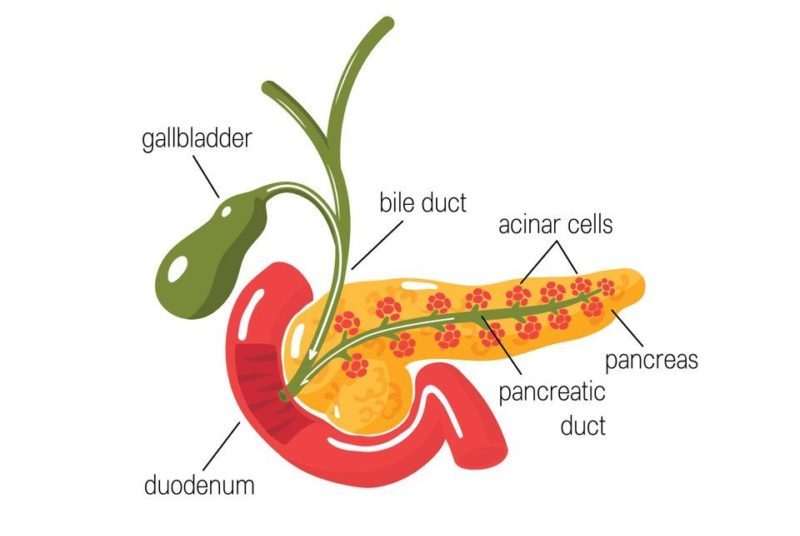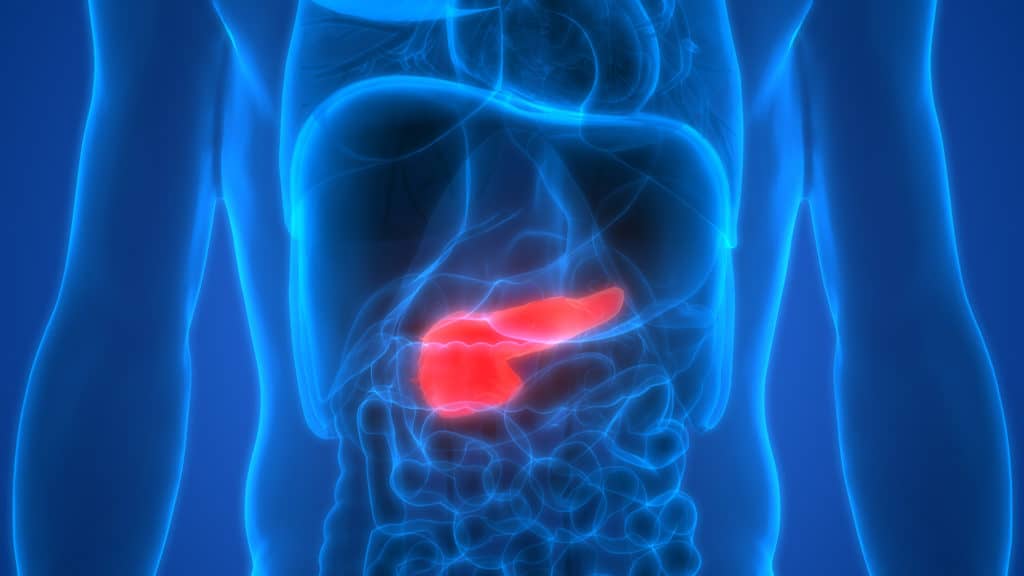Usually we only visit a doctor once we are experiencing symptoms, by which point the condition will have progressed and for diseases like pancreatic cancer, a person may have missed out on potentially curative treatments. This is why early detection is the philosophy at Echelon Health. Led by one of Harley Streets leading consultant physicians Dr Jenkins MA MD FRCP, Echelon Health is a world-leading provider of preventative Health Assessments.
Needless to say, it is very wise to keep in mind the symptoms of pancreatic cancer,so we will delve into them here. However, in order to improve your chances of survival, ideally cancer is detected before symptoms are experienced. Therefore, we will discuss how you can go about catching this disease early and where you can receive a pancreatic cancer diagnosis in London.
What does the pancreas do?
The pancreas is located in your abdomen and has important exocrine (digestive) and endocrine (hormonal) functions;
Digestive functions: acinar cells in the pancreas secrete juices into the small intestine which contain enzymes essential for digestion. The pancreas also secretes bile to help digest fats.
Hormone functions: clusters of specialised cells known as the islets of Langerhans secrete important hormones into the bloodstream. The main pancreatic hormones regulate blood sugar levels, with insulin causing it to drop and glucagon causing it to rise.
Depending on where the pancreatic cancer originates, it may interfere with the secretion of digestive enzymes or production of blood sugar hormones. This will drastically influence the symptoms a person experiences.

What Is Pancreatic Cancer?
Cancer is an abnormal growth of cells which proliferate in an uncontrolled way forming a tumour which, if it is not treated early, metastasize (spread) to other parts of the body. It is the result of DNA mutations that inhibit normal cell function and cause uncontrolled growth and division.
In its early stages, pancreatic cancer is quiet and usually does not cause any symptoms. Typically in the UK we only see our GP once we are experiencing unpleasant symptoms, however by this point the cancer may have spread. Sadly, when the disease is found late, it is much more likely to lead to a poor prognosis.
This is why preventative Health Assessments are such a valuable investment – catching a condition like pancreatic cancer early may add years to your life.
Symptoms Of Pancreatic Cancer
- Jaundice (a yellowing of your skin and eyes).
- Unexplained weight loss
- Feelings of fatigue
- Feelings of depression
- Pain in your back and/or in your upper or middle abdomen
- Loss of appetite
- Nausea and vomiting
- Itchy skin
- Feeling thirsty or having to urinate often – if it affects your blood sugar
This list is not exhaustive – for more detailed information visit Pancreatic Cancer Action.
Causes of Pancreatic Cancer
- Smoking: 25% of pancreatic cancers are thought to be caused by smoking. Studies such as this one from the journal Pancreatology point to around 60 carcinogenic compounds in tobacco smoke which are likely to stimulate pancreatic cancer progression. To learn more about the risk factors associated with smoking, check out this Pancreatic Cancer Action
- Inherited conditions: pancreatic cancer can run in some families, where inherited gene mutations may account for around 10% of pancreatic cancers. One example is familial pancreatitis, which is inflammation of the pancreas caused by mutations to the PRSS1 gene.
- Obesity: having a BMI of 30 or more increases a person’s likelihood of developing pancreatic cancer by 20%. Often these people have type 2 diabetes.
- Long-standing diabetes: those with type-2 diabetes have an increased risk, probably because the insulin producing cells in the islets of Langerhans are constantly being stimulated, however hormonal imbalances and damage caused by elevated blood glucose will likely be involved in the development of pancreatic cancer.
- Age: the risk of all cancers increases with age. This reflects the accumulation of genetic mutations over time and the result is that almost all those diagnosed with pancreatic cancer are over 45, however it is not unknown in people younger.
- Race: in the UK pancreatic cancer is more common in White and Black people than in Asian people.
There are many potential causes and risk factors for pancreatic cancer. Some we can control with a healthy lifestyle, others, namely age and genetics, we can’t. Therefore, as pancreatic cancer has one of the worst survival rates, having an early diagnosis is paramount. To avoid a pancreatic cancer diagnosis when it is too late, we recommend attending a full body MOT.
Is Pancreatic Cancer Curable?
If caught in time, the disease can be treated. You might need to have part or all of the pancreas removed during surgery, and chemotherapy will also be advised. There are other ways to treat the disease, and you can find out more on from Pancreatic Cancer Action.
Again, in order to avoid a late pancreatic cancer diagnosis it is wise to attend a full body MOT in London, such as those at Echelon Health.

Preventing a late Pancreatic Cancer Diagnosis in London
Usually we only visit a doctor once we are experiencing symptoms, by which point the condition will have progressed and for diseases like pancreatic cancer, a person may have missed out on potentially curative treatments. This is why early detection is the philosophy at Echelon Health. Led by one of Harley Streets leading consultant physicians Dr Jenkins MA MD FRCP, Echelon Health is a world-leading provider of preventative Health Assessments.
There are several methods of detecting pancreatic cancer, from endoscopies, to MRIs and blood test, but the best method is through a high resolution CT scan of your abdomen. Our Gold, Platinum and Evergreen packages include a CT of the Abdomen which will detect any abnormalities of the pancreas and surrounding organs including the liver, gallbladder, spleen and adrenal glands. The Platinum full body MOT is key to our ability to detect up to 92% and 95% of preventable causes of death among men and women respectively.
Additionally, all our clients undergo blood tests for over 40 parameters. These include liver function tests which can indicate elevated bilirubin, as well as Ca 19-9 and CEA tumour markers, all of which tell doctors if there is anything abnormal with the pancreas and will help make a pancreatic cancer diagnosis. View the Body Map for a breakdown of our scans, blood tests and the diseases we detect.
Pancreatic Cancer Diagnosis in London
For a pancreatic cancer diagnosis in London, contact Echelon Health. We will be happy to discuss our packages with you and answer any questions you may have. To get in touch call us on +44 (0)20 7580 7688 or click the button below and we will be sure to call you back.
Make an Enquiry
Sources
Pancreatic Cancer UK – Statistics
American Cancer Society – Signs and Symptoms of Pancreatic Cancer
Pancreatology (journal) – The Burning Question: Why is Smoking a Risk Factor for Pancreatic Cancer?



